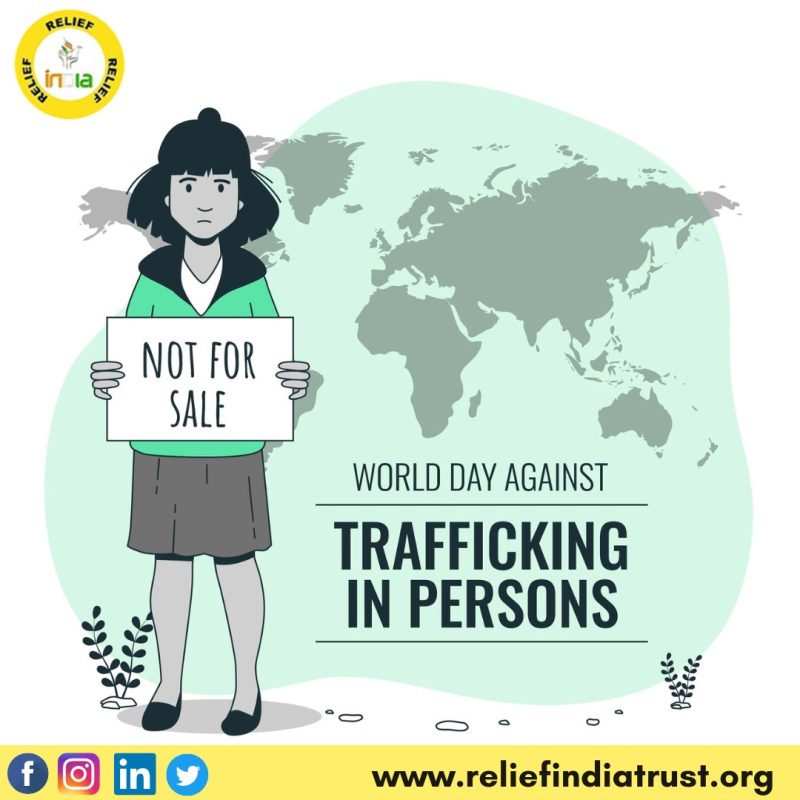Human trafficking is a widespread and often overlooked crime occurring all over the globe. Many people choose not to interfere or help those affected due to a lack of knowledge and resources. Unfortunately, individuals continue to fall victim to this heinous crime every day. On National Human Trafficking Awareness Day. Relief India Trust aims to bring hope to society and communities by raising awareness of this grave issue through various initiatives.
Relief India Trust: Shedding Light on National Human Trafficking Awareness Day
National Human Trafficking Awareness Day is observed on January 11 each year. Aiming to highlight the urgent issue of human trafficking and the need for awareness and action. This day serves as a crucial reminder of the millions of individuals. Including men, women, and children, who fall victim to this heinous crime around the globe.
On this day, various events and campaigns are organized to educate the public about the red flags of human trafficking. Emphasizing the importance of vigilance and reporting suspicious activities. Social media campaigns, workshops, and community discussions aim to empower individuals to take a stand against trafficking.
By shedding light on this Day, Relief India Trust works tirelessly to create a safer environment for everyone. Awareness leads to action; thus. This day is crucial for building a collective movement toward ending human trafficking and supporting survivors.
Untying the Impact of Human Trafficking on Lives
Human trafficking is a complex and harrowing issue that profoundly impacts the lives of countless individuals. Often leaving scars that last a lifetime. Victims, who can be men, women, and children, endure inhumane conditions, deprived of their basic rights and freedoms. The psychological toll is immense; survivors frequently grapple with trauma, anxiety, and depression. Which can hinder their ability to reintegrate into society and lead fulfilling lives.
The impact extends beyond the individuals; it ripples through families and communities, eroding trust and safety. Economic ramifications are significant as well, as victims are often exploited for cheap labor or sex. Which not only deepens their plight but also perpetuates cycles of poverty and inequality.
Furthermore, the stigma associated with being trafficked can isolate survivors. Making it challenging for them to access support services and rebuild their self-esteem. It is crucial to raise awareness and foster a compassionate environment that empowers survivors. Promotes healing, and addresses the systemic issues that facilitate trafficking in the first place. Addressing human trafficking requires a multifaceted approach. Focusing not just on prevention and law enforcement but also on providing. Comprehensive support and opportunities for those affected to reclaim their lives and dignity.
The Devastating Consequences of Trafficking on a Nation’s Prospects
Human trafficking poses severe consequences on a nation’s social and economic stability, undermining its prospects for growth and development. This heinous crime not only violates the fundamental rights of individuals but also contributes to significant public health issues. Including the spread of diseases and mental health disorders among victims. Economically, trafficking depletes human resources, adversely affecting productivity and innovation within communities.
The societal fabric becomes frayed as families are torn apart and trust within communities erodes. Moreover, the presence of trafficking networks can lead to increased crime rates. Placing additional strain on law enforcement and judicial systems. To combat these effects, nations must implement comprehensive policies focused on prevention, protection, and prosecution.
Legislative Framework Addressing Human Trafficking in India
India has enacted several laws to combat human trafficking and protect the rights of victims. The primary legislation is the Immoral Traffic (Prevention) Act, 1956, which aims to prevent trafficking for commercial sexual exploitation. Additionally, the Protection of Children from Sexual Offences (POCSO) Act, 2012 addresses sexual abuse against children, including trafficking. The Indian Penal Code (IPC) also contains provisions related to trafficking, specifically under sections pertaining to kidnapping and forced labor.
Furthermore, the Human Trafficking (Investigative Trafficking) Bill, though still in discussion, proposes stricter measures for prevention and response. The government has established a National Policy Against Human Trafficking to facilitate coordination among various stakeholders and improve enforcement mechanisms. Collectively, these laws reflect India’s commitment to combating human trafficking and safeguarding vulnerable populations.
Relief India Trust’s Initiatives to Combat Human Trafficking in India
At Relief India Trust, we envision a world where freedom prevails and human trafficking is a thing of the past. Our grassroots awareness initiatives are designed for marginalized communities and aim to break the silence surrounding this heinous crime.
Through engaging outreach programs, we educate and empower vulnerable populations. Equipping them with the knowledge needed to protect themselves and their families. Our interactive workshops inspire essential conversations, fostering resilience and hope among those most at risk.
In addition, our confidential counseling services offer a safe space for survivors to share their experiences. Heal, and regain their strength. At Relief India Trust, we strive to unite communities in the fight against human trafficking. Mobilizing collective efforts in pursuit of freedom for all.
Conclusion
On National Human Trafficking Awareness Day. Relief India Trust reaffirms its commitment to raising awareness and fostering action against the grave issue of human trafficking. This day serves not only as a reminder of the urgent need to combat this crime. But also as an opportunity to unite individuals, communities in our shared goal of bringing hope and healing to victims. By educating ourselves about the signs of trafficking and promoting supportive environments, we can empower survivors and prevent future occurrences.
Click on https://www.reliefindiatrust.org/ to read and know more about NGOs Relief India Trust NGO. Follow us on Facebook, Instagram, Twitter, and LinkedIn for daily updates. We update our various activities that help the poor better survive.

